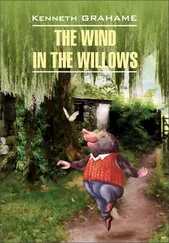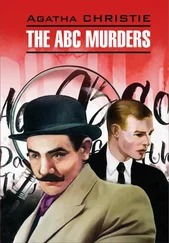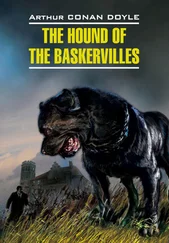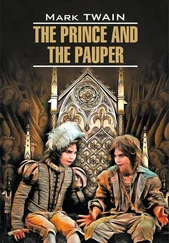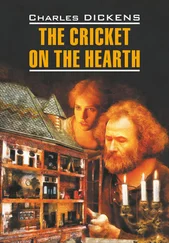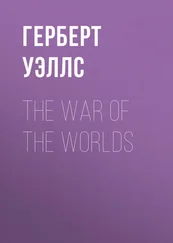Yet so vain is man, and so blinded by his vanity, that no writer, up to the very end of the nineteenth century, expressed any idea that intelligent life might have developed there far, or indeed at all, beyond its earthly level. Nor was it generally understood that since Mars is older than our earth, with scarcely a quarter of the superficial area and remoter from the sun, it necessarily follows that it is not only more distant from time’s beginning but nearer its end.
The secular cooling that must someday overtake our planet has already gone far indeed with our neighbour. Its physical condition is still largely a mystery, but we know now that even in its equatorial region the midday temperature barely approaches that of our coldest winter. Its air is much more attenuated than ours, its oceans have shrunk until they cover but a third of its surface, and as its slow seasons change huge snowcaps gather and melt about either pole and periodically inundate its temperate zones. That last stage of exhaustion, which to us is still incredibly remote, has become a present-day problem [2] a present-day problem – ( зд. ) животрепещущие (насущные) проблемы
for the inhabitants of Mars. The immediate pressure of necessity has brightened their intellects, enlarged their powers, and hardened their hearts. And looking across space with instruments, and intelligences such as we have scarcely dreamed of, they see, at its nearest distance only 35,000,000 of miles sunward of them, a morning star of hope, our own warmer planet, green with vegetation and grey with water, with a cloudy atmosphere eloquent of fertility, with glimpses through its drifting cloud wisps of broad stretches of populous country and narrow, navy-crowded seas.
And we men, the creatures who inhabit this earth, must be to them at least as alien and lowly as are the monkeys and lemurs to us. The intellectual side of man already admits that life is an incessant struggle for existence, and it would seem that this too is the belief of the minds upon Mars. Their world is far gone in its cooling and this world is still crowded with life, but crowded only with what they regard as inferior animals. To carry warfare sunward is, indeed, their only escape from the destruction that, generation after generation, creeps upon them.
And before we judge of them too harshly we must remember what ruthless and utter destruction our own species has wrought, not only upon animals, such as the vanished bison and the dodo [3] dodo – дронт, вымершая в XVII–XVIII вв. птица
, but upon its inferior races. The Tasmanians [4] Tasmanians – тасманийцы, коренное население острова Тасмания, в XIX в. истреблены английскими колонизаторами
, in spite of their human likeness, were entirely swept out of existence in a war of extermination waged by European immigrants, in the space of fifty years. Are we such apostles of mercy as to complain if the Martians warred in the same spirit?
The Martians seem to have calculated their descent with amazing subtlety – their mathematical learning is evidently far in excess of ours – and to have carried out their preparations with a well-nigh perfect unanimity. Had our instruments permitted it, we might have seen the gathering trouble far back in the nineteenth century. Men like Schiaparelli [5] Schiaparelli – Джованни Вирджинио Скиапарелли (1835–1910), итальянский астроном, в 1877 г. обнаружил на Марсе сеть тонких линий, так называемых каналов
watched the red planet – it is odd, by-the-bye, that for countless centuries Mars has been the star of war – but failed to interpret the fluctuating appearances of the markings they mapped so well. All that time the Martians must have been getting ready.
During the opposition of 1894 a great light was seen on the illuminated part of the disk, first at the Lick Observatory, then by Perrotin of Nice, and then by other observers. English readers heard of it first in the issue of Nature dated August 2. I am inclined to think that this blaze may have been the casting of the huge gun, in the vast pit sunk into their planet, from which their shots were fired at us. Peculiar markings, as yet unexplained, were seen near the site of that outbreak during the next two oppositions.
The storm burst upon us six years ago now. As Mars approached opposition, Lavelle of Java set the wires of the astronomical exchange palpitating with the amazing intelligence of a huge outbreak of incandescent gas upon the planet. It had occurred towards midnight of the twelfth; and the spectroscope, to which he had at once resorted, indicated a mass of flaming gas, chiefly hydrogen, moving with an enormous velocity towards this earth. This jet of fire had become invisible about a quarter past twelve. He compared it to a colossal puff of flame suddenly and violently squirted out of the planet, “as flaming gases rushed out of a gun.”
A singularly appropriate phrase it proved. Yet the next day there was nothing of this in the papers except a little note in the Daily Telegraph , and the world went in ignorance of one of the gravest dangers that ever threatened the human race. I might not have heard of the eruption at all had I not met Ogilvy, the well-known astronomer, at Ottershaw. He was immensely excited at the news, and in the excess of his feelings invited me up to take a turn with him [6] to take a turn with him – ( зд. ) вместе понаблюдать
that night in a scrutiny of the red planet.
In spite of all that has happened since, I still remember that vigil very distinctly: the black and silent observatory, the shadowed lantern throwing a feeble glow upon the floor in the corner, the steady ticking of the clockwork of the telescope, the little slit in the roof – an oblong profundity with the stardust streaked across it. Ogilvy moved about, invisible but audible. Looking through the telescope, one saw a circle of deep blue and the little round planet swimming in the field. It seemed such a little thing, so bright and small and still, faintly marked with transverse stripes, and slightly flattened from the perfect round. But so little it was, so silvery warm – a pin’s-head of light! It was as if it quivered, but really this was the telescope vibrating with the activity of the clockwork that kept the planet in view.
As I watched, the planet seemed to grow larger and smaller and to advance and recede, but that was simply that my eye was tired. Forty millions of miles it was from us – more than forty millions of miles of void. Few people realise the immensity of vacancy in which the dust of the material universe swims.
Near it in the field, I remember, were three faint points of light, three telescopic stars infinitely remote, and all around it was the unfathomable darkness of empty space. You know how that blackness looks on a frosty starlight night. In a telescope it seems far profounder. And invisible to me because it was so remote and small, flying swiftly and steadily towards me across that incredible distance, drawing nearer every minute by so many thousands of miles, came the Thing they were sending us, the Thing that was to bring so much struggle and calamity and death to the earth. I never dreamed of it then as I watched; no one on earth dreamed of that unerring missile.
That night, too, there was another jetting out of gas from the distant planet. I saw it. A reddish flash at the edge, the slightest projection of the outline just as the chronometer struck midnight; and at that I told Ogilvy and he took my place. The night was warm and I was thirsty, and I went stretching my legs clumsily and feeling my way in the darkness, to the little table where the siphon stood, while Ogilvy exclaimed at the streamer of gas that came out towards us.
Читать дальше
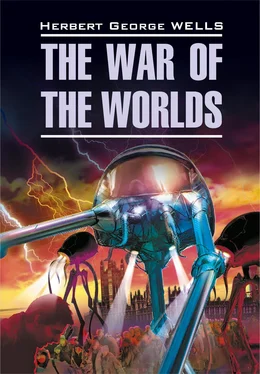
![Герберт Уэллс - The War of the Worlds [С англо-русским словарем]](/books/26611/gerbert-uells-the-war-of-the-worlds-s-anglo-thumb.webp)


